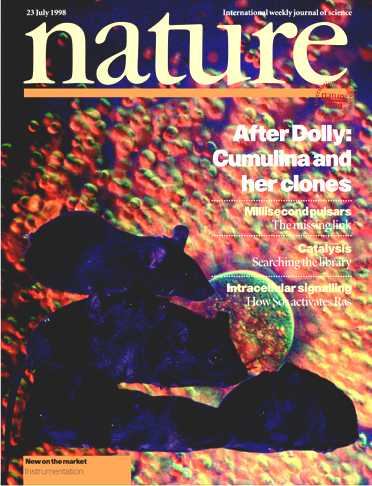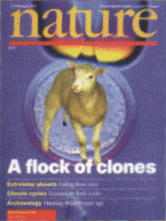 |
|
|
|
|
 |
|
 |
|
|
|
|
 |
|
A New
Scientist Cloning News Resource An extensive and very useful set or
articles and links.
A Radio
Broadcast from NPR: The entire NPR program in which Dr. Richard
Seed, A Harvard physicist and researcher/coordinator of IVF techniques,
is interviewed about his plans to set up a Human Clone Clinic either i
Chicago or the Bahamas. One needs a RealAudio player plug-in for
his/her browser to hear the streaming audio. with this plug-in, the
"download" time is nearly nonexistent because the audio is played as it
is received/transmitted over the Internet! Science and technology
are wonderful aren't they?
An
article from Johns Hopkins University online The article describes
the ethics committee approved plans of a south African doctor, Dr. Mohamed
Cassim plans to clone either the husband or wife for "desperate" infertile
couples.
A Superb Online Experience
From Time Magazine: There are about 6 introductory frames with
ponderous quotes, animation and interesting music. After this there
are 3 sections all of which tend to have media photos and audio along with
the text. First the story is told then the future implications and
finally ethics are considered. At the end highlights from an online
chat of bioethicists is presented and a live chat forum is made available.
(The cloning chat topic has long since March of '96 petered out.)
Also, you can still participate in an online survey... actually as many
times as you want. "Vote early and often" as they have said in Chicago.
:-)
An Online Science Magazine for Laymen Explains How Dolly Was Cloned.
Adult Human Cloning Bioethical Forum The magazine New Scientist hosts a bioethical forum on the pros and cons of cloning humans.
Discourse on Human Cloning Patrick Dixon of CyberMagazine and Director of Global Contact Global Change discusses the issues raised with the arrival of human cloning.
Clone
Digest electronic magazine An electronic magazine that reports events
in cloning research worldwide especially that of primates and the "probability"
of human cloning
The New York Times Online: There is a slightly annoying registration process that is free (but you need to remember your password - hmm they can monitor your frequency of access and limit how often you arrive?) It is worth it though. Go to these sites and download/save them in case you can't get the information later:
"The Exploratorium's Ethical Scenarios Forum (ETHEX)
is an Internet listserv developed for the Exploratorium exhibition 'Diving
Into the Gene Pool' beginning in April, 1995. With the cooperation
of members of the International Bioethics Institute, Exploratorium
staff, visitors, and remote users discuss topics around the ethical, legal,
and social implications of the Human Genome Project and other genetics
topics." This is a quote from the page itself. Especially if you
read The Clones
Are Coming you can see how the Human Genome Project is the future of
biology and modern 21st Century molecular medicine. The information
collected from this project is stored in a database called Online
Mendalian Inheritance In Man (OMIM) and catalogs all of the genes discovered
through the project.